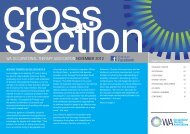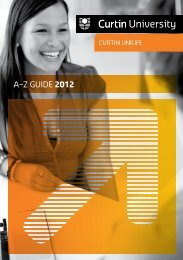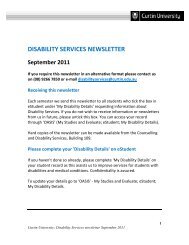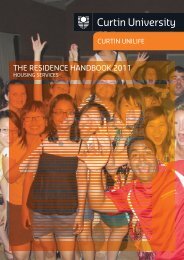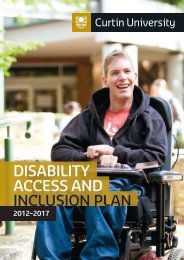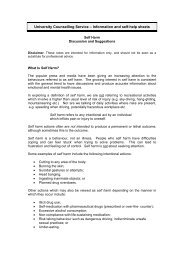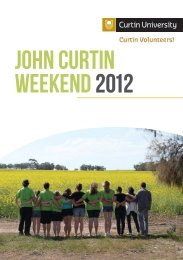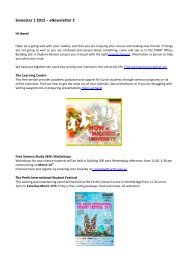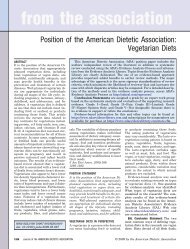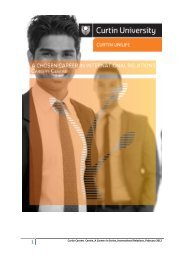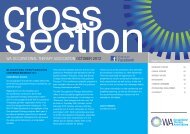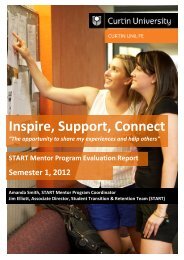UniPASS Report Semester 1 2012 - Unilife - Curtin University
UniPASS Report Semester 1 2012 - Unilife - Curtin University
UniPASS Report Semester 1 2012 - Unilife - Curtin University
Create successful ePaper yourself
Turn your PDF publications into a flip-book with our unique Google optimized e-Paper software.
Feedback from Non-Attendees (continued)<br />
<strong>UniPASS</strong> <strong>Semester</strong> 1 <strong>2012</strong> <strong>Report</strong><br />
Figure 6<br />
40%<br />
30%<br />
20%<br />
10%<br />
0%<br />
'I am satisfied with my progress in the<br />
unit'<br />
Strongly<br />
Agree<br />
Agree<br />
Somewhat Somewhat Disagree<br />
Agree Disagree<br />
Strongly<br />
Disagree<br />
This question attempted to see if students believed they needed <strong>UniPASS</strong>. Only 10% of respondents claimed<br />
they were not satisfied with their progress in the unit to some degree, indicating that 90% of these students did<br />
not feel they needed <strong>UniPASS</strong>. The average fail rate of all <strong>UniPASS</strong> supported units is 29% with some units having<br />
fail rates over 40% (Figure 1). Given that this survey was conducted before final grades were released because it<br />
was initially paper based, students may have been unduly optimistic in their anticipated final grade and therefore<br />
not have been aware of their need for extra study support as only 11% were dissatisfied with their progress but<br />
almost 30% failed the unit. It is worth considering whether to conduct this survey once the grades are released<br />
but this could result in a lower response rate.<br />
Figure 7<br />
'I now wish I had attended <strong>UniPASS</strong><br />
regularly'<br />
63%<br />
37%<br />
Yes<br />
No<br />
The previous question showed that only 11% of students were dissatisfied with their progress to some degree<br />
but here 37% of respondents said they now wish that they had attended <strong>UniPASS</strong> regularly. This could highlight<br />
that the non-remedial aspect of the program is being communicated successfully to students so that even<br />
though they are satisfied with their progress they want to do better. Further, this figure could be indicating that<br />
positive evaluations of <strong>UniPASS</strong> by regular attendees had been passed on to non-attendees by word of mouth so<br />
non-attendees would now like to have attended.<br />
37% is still a significant number of students who would like to attend. This represents an increase of 153<br />
students or an increase in regular attendees of 60%. This figure demonstrates strong positive support for the<br />
program even among those who were not regular participants.<br />
Raphael Pereira September <strong>2012</strong> UniLife – START – <strong>UniPASS</strong> 14



